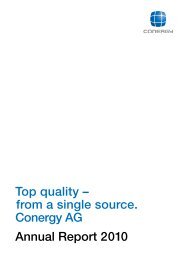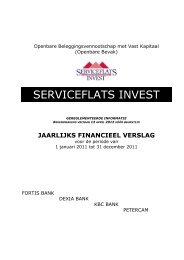BOC Report and accounts 2005 - Alle jaarverslagen
BOC Report and accounts 2005 - Alle jaarverslagen
BOC Report and accounts 2005 - Alle jaarverslagen
You also want an ePaper? Increase the reach of your titles
YUMPU automatically turns print PDFs into web optimized ePapers that Google loves.
Risk factors 39<br />
<strong>BOC</strong> relies on development of, or access to, technology to support business growth<br />
<strong>BOC</strong>’s success is dependent in part on its continued investment in technology to develop new products <strong>and</strong><br />
services across all businesses, new applications for existing products or to design effective means for producing<br />
industrial gases. Failure to access or develop technology or anticipate, manage or adopt technological changes in<br />
operations or product applications on a timely basis will have a material impact on <strong>BOC</strong>’s future results. For<br />
example, the rapid development of technology in the semiconductor sector requires <strong>BOC</strong> Edwards to be aware<br />
of changes in customer technology requirements <strong>and</strong> to introduce new products to meet those requirements in a<br />
timely manner. Failure to do so could result in reduced market share <strong>and</strong> profitability.<br />
Recognising <strong>and</strong> anticipating changes in the manufacturing economy is key to <strong>BOC</strong>’s success<br />
<strong>BOC</strong>’s industrial gas businesses serve a wide range of manufacturing customers in major geographies such as the<br />
US, UK, Japan <strong>and</strong> Australia.This is particularly true of the Industrial <strong>and</strong> Special Products line of business which<br />
provides products <strong>and</strong> services to customers involved in the welding <strong>and</strong> cutting of metal, a major source of<br />
revenue for this division.As customers in these traditional manufacturing-based economies seek to move their<br />
manufacturing operations to lower cost territories in, for example,Asia <strong>and</strong> Latin America, the risk arises that<br />
<strong>BOC</strong>’s operations in the major geographies will have lower growth opportunities. Failure to recognise these trends<br />
<strong>and</strong> manage the consequences, through the development of alternative markets <strong>and</strong>/or meeting dem<strong>and</strong> in higher<br />
growth territories, could have a negative impact on future Group financial results.<br />
<strong>BOC</strong>’s success depends to a significant extent on its key personnel <strong>and</strong> employees<br />
<strong>BOC</strong>’s performance depends on the skills <strong>and</strong> efforts of its employees <strong>and</strong> management team across all of its<br />
businesses. <strong>BOC</strong> recognises that failure to attract new talent <strong>and</strong> retain existing expertise, knowledge <strong>and</strong> skills in<br />
operations, products <strong>and</strong> infrastructure areas such as information technology could have a negative impact on<br />
revenues <strong>and</strong> profits. In addition, the success of <strong>BOC</strong>’s acquisitions may depend, in part, on <strong>BOC</strong>’s ability to retain<br />
management personnel of acquired companies.<br />
Litigation may have an adverse impact on financial results<br />
The global nature of <strong>BOC</strong>’s business exposes it to the potential for litigation from third parties. From time to time<br />
<strong>BOC</strong> is involved in lawsuits, resulting from current <strong>and</strong> past operations or products.The outcome of these lawsuits<br />
may result in damages <strong>and</strong> awards which could have a material impact on <strong>BOC</strong>’s profitability, its business operations<br />
or financial condition. Examples of litigation in the US for past products include allegations of injury arising from the<br />
use of welding electrodes previously manufactured <strong>and</strong> distributed by <strong>BOC</strong> in the US.<br />
Increased energy costs could reduce profitability<br />
The production of industrial gases requires significant amounts of electrical energy. Energy costs are a key<br />
component of the cost of manufacturing industrial gases, <strong>and</strong> increases in these costs can impact profitability if they<br />
cannot be passed on to customers.Accurately predicting trends in energy costs is difficult to achieve as energy<br />
costs are to a large extent subject to factors beyond the company’s control – for example, political conditions in oil<br />
producing regions. <strong>BOC</strong> also operates large fleets of commercial vehicles in certain major geographies.An increase<br />
in energy costs associated with the use of these commercial vehicles may negatively impact profit levels.<br />
Further consolidation between major competitors may impact <strong>BOC</strong>’s competitive position<br />
A merger between any of the major competitors to <strong>BOC</strong> within the principal geographies, subject to competition<br />
authority consent, could result in a longer-term deterioration of <strong>BOC</strong>’s competitive position resulting in reduced<br />
levels of growth. Possible consequences could include:<br />
• an uncompetitive cost base for large projects;<br />
• an inability to participate in further consolidation due to competition concerns;<br />
• retention <strong>and</strong>/or recruitment of key personnel;<br />
• weakened geographical positions.<br />
Managing joint venture relationships is a key success factor for <strong>BOC</strong><br />
<strong>BOC</strong> needs to ensure that the selection of joint venture partners in new ventures <strong>and</strong> the relationships with<br />
partners in existing relationships is managed effectively to ensure the full potential for the joint venture is achieved.<br />
Failure to achieve alignment of objectives <strong>and</strong> manage relationships effectively may negatively impact future growth<br />
<strong>and</strong> profit levels.<br />
Failure to renew major contracts could reduce profitability<br />
All of <strong>BOC</strong>’s businesses operate in very competitive markets.The loss of major contracts through competitive<br />
forces, changes in customer purchasing strategy or changes in customer location, could have a negative impact on<br />
Group financial results.<br />
Identifying growth opportunities <strong>and</strong> productivity improvements are necessary for longer<br />
term success<br />
Failure to identify <strong>and</strong> execute growth <strong>and</strong> productivity opportunities effectively will limit increases in profitability.These<br />
risks can materialise from inadequate processes or a lack of resources to identify opportunities <strong>and</strong> exploit them.<br />
Adoption of accounting changes or new regulations can increase costs <strong>and</strong> reduce profitability<br />
The implementation of new accounting requirements (for example, International Financial <strong>Report</strong>ing St<strong>and</strong>ards) or<br />
regulations (for example, the US Sarbanes-Oxley Act) can incur significant costs which reduce profitability. Increased<br />
costs arise through recruitment of additional resources, consultancy fees to support implementation or increased<br />
external audit fees.

















